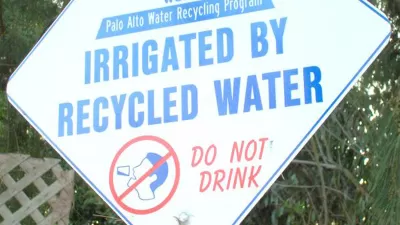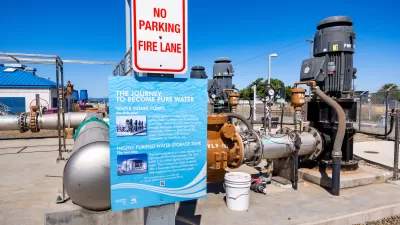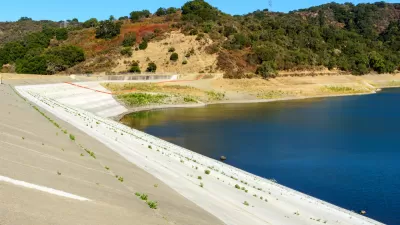San Francisco's PUC headquarters, "one of the greenest buildings in the nation," cut costs while introducing cutting-edge sustainable technologies to the city.
In the midst of the 2012 recession, during a construction downturn, San Francisco's Public Utilities Commission made the somewhat unusual decision to build a brand new, state-of-the-art headquarters.
In doing so, it saved ratepayers $3.7 billion over the building’s 100-year lifespan—and provided a model for sustainable development in the city with pioneering approaches to earthquake resiliency, renewable energy, and water recycling.
The 13-story, 277,000-square-foot HQ is rated LEED Platinum. It's the first building in the city with an onsite recycling system for non-potable wastewater, and spurred the creation of a citywide permitting process for similar systems.
The Living Machine, as it's called, treats about 5,000 gallons of water per day, enough to supply the building’s low-flow toilets and urinals. In all, the building uses 60 percent less water than similarly sized buildings—and even harvests rainwater in a 25,000-gallon cistern.
An integrated hybrid solar array and wind turbine generates 227,000 kilowatts a year, or about seven percent of the building’s annual energy needs.
Smart solutions at every level worked to make sustainability and resilience affordable. An innovative approach to earthquake safety also worked to reduce the building height, in turn bringing down the total construction cost.
That approach was the now-common use of vertical, rather than horizontal, post-tension. In layman’s terms, "Our building acts like a tuning fork. It moves back and forth, and then it comes back into place after the shaking has stopped."
SFPUC's general manager Harlan Kelly explains more about the building, and what made it possible, in The Planning Report.
FULL STORY: San Francisco PUC Built State-of-the-Art Sustainable Headquarters

Maui's Vacation Rental Debate Turns Ugly
Verbal attacks, misinformation campaigns and fistfights plague a high-stakes debate to convert thousands of vacation rentals into long-term housing.

Planetizen Federal Action Tracker
A weekly monitor of how Trump’s orders and actions are impacting planners and planning in America.

Chicago’s Ghost Rails
Just beneath the surface of the modern city lie the remnants of its expansive early 20th-century streetcar system.

Bend, Oregon Zoning Reforms Prioritize Small-Scale Housing
The city altered its zoning code to allow multi-family housing and eliminated parking mandates citywide.

Amtrak Cutting Jobs, Funding to High-Speed Rail
The agency plans to cut 10 percent of its workforce and has confirmed it will not fund new high-speed rail projects.

LA Denies Basic Services to Unhoused Residents
The city has repeatedly failed to respond to requests for trash pickup at encampment sites, and eliminated a program that provided mobile showers and toilets.
Urban Design for Planners 1: Software Tools
This six-course series explores essential urban design concepts using open source software and equips planners with the tools they need to participate fully in the urban design process.
Planning for Universal Design
Learn the tools for implementing Universal Design in planning regulations.
planning NEXT
Appalachian Highlands Housing Partners
Mpact (founded as Rail~Volution)
City of Camden Redevelopment Agency
City of Astoria
City of Portland
City of Laramie





























